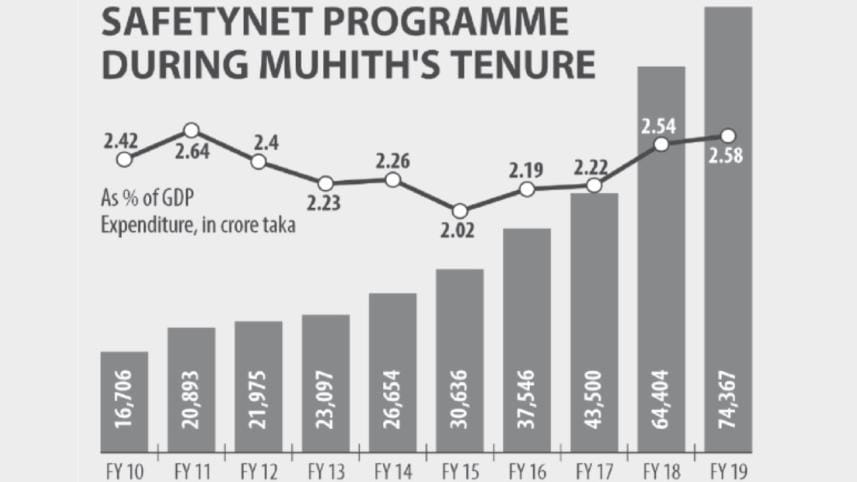Safety for 16 lakh more

In a push to widen the social safety net, the government decided to include all registered differently abled people, and more marginalised and vulnerable ones under its protection.
Some 15.45 lakh people would be added to the government's core social safety net programmes in fiscal year 2019-20 taking the total to 1.13 crore.
Now, 97.13 lakh people receive allowances under 17 social protection and several other social safety net programmes of the government.
Last year, seven lakh new beneficiaries were included.
Even though Bangladesh made remarkable progress by getting 1.6 crore people out of poverty over the last decade, 12.9 percent of the population are still ultra-poor and live on less than $1.90 a day, the global poverty line, according to the Bangladesh Bureau of Statistics.
The government has also planned to gradually bring all cash transfers under the government to persons (G2P) system so that the recipients do not have to jump through hoops to get the money.
Under the G2P system, payments are processed from the government exchequer to the beneficiary's bank or mobile bank account.
The government yesterday proposed allocation of Tk 74,367 crore for all its safety net programmes, up by Tk 9,963 crore from last year.
Last year, the government had allocated 14.55 percent of its entire budget for social safety net programmes but this year it dropped to 14.21 percent.
However, it plans to double the allocation in the next five years.
Economist Hossain Zillur Rahman, also a former adviser to a caretaker government, told The Daily Star that the steps taken so far were better than before and would help reduce the rich-poor gap. He, however, said the allocation should have been even bigger considering recent inflation.
"Protecting people from risks and human resource development are the two main objectives of the social safety net," he said.
On the G2P system, he said, "Some of the payments are being made directly to bank accounts or mobile banking accounts. All projects should be brought under this system."
Zillur said the government yesterday did not propose any new areas of safety net coverage, like healthcare for the marginalised.
KAM Morshed, director advocacy at Brac, told The Daily Star yesterday that the allocated amount was not bad. He, however, said there were problems in beneficiary selection and the existing fund transfer process.
He said the amount of increased allowances beneficiaries would get was small. The government itself has identified these problems. If these are addressed properly, the existing allocation will be more fruitful, he said.
Morshed lauded the government's plan to an arrange universal pension scheme.
All registered insolvent people with disabilities (15.45 lakh) would get government allowances, according to the proposed budget. In this fiscal year, only 10 lakh got the benefit.
This year, 1 lakh differently abled students would get stipends, up from 90,000.
A primary student would get Tk 750 instead of Tk 700, secondary student Tk 800 instead of Tk 750, and higher secondary students would also get a Tk 50 increase in allowances.
The budget proposed state honorarium for valiant freedom fighters at Tk 12,000, up from Tk 10,000.
At least 4 lakh more people would get old-age allowance. Now, 40 lakh get the benefit.
Fourteen lakh widows and victims of domestic violence receive government allowances and in the upcoming fiscal year 3 lakh more would be added.
Additional 20,000 gypsies and people of disadvantaged communities would be added to the existing list of 64,000 getting benefits from the government.
The number of beneficiaries in the Third Gender Livelihood Development programmes would increase to 6,000 so that all people of the gender come under the net.
Nearly double the cancer, kidney, liver cirrhosis, and paralysis patients (30,000 total) would get government benefits in the upcoming fiscal year.
At least, 70,000 more poor mothers (7.7 lakh total) would get maternity allowances.




 For all latest news, follow The Daily Star's Google News channel.
For all latest news, follow The Daily Star's Google News channel.
Comments